August 4, 2023
Local's Guide to Mariazell, the Top Pilgrimage site in Austria
Active life, Culture, Guide, History
This page contains links through which we may earn a small commission should you decide to book a tour from our partner.
Top attractions:
Quick Navigation
About Mariazell
In the heart of Austria, nestled amid the alpine beauty of the Styrian Alps, lies Mariazell, a small town with an exceptionally rich history of turmoil, human resilience, and belief. Known as the most important pilgrimage site in Austria and one of the most significant in Central Europe, Mariazell has a historical tapestry as unique and vibrant as the landscape that cradles it. The town is a perfect mix of culture and nature, making it a popular destination not only among believers but nature lovers as well, especially in winter for skiing. Considering all things, it is not that easy to tell if the nature of the town is the most attractive aspect of this wonderful symbiosis. Probably, one fits the other, making Mariazell a truly exceptional travel destination.
Among the locals and believers, Mariazell is best known for being the home of a small but very powerful Virgin Mary, which is entitled today as the Magna Mater Austriae, or simply – the Great Mother of Austria. This is no mere status, given that the Empire of Habsburgs has seen such prominent and powerful women like Empress Maria Theresa and Empress Sisi. This impressive status alone, should raise the eyebrows and make curious anyone who’s heard of it. Well, go and see it. Mariazell could be reached between 3, and 3 and a half hours with public transport. If you are short on time and interested in visiting the most popular Austrian religious sites, it might be worth your time considering a tour, which will bring you to both Mariazell and Melk Abbey within a day.
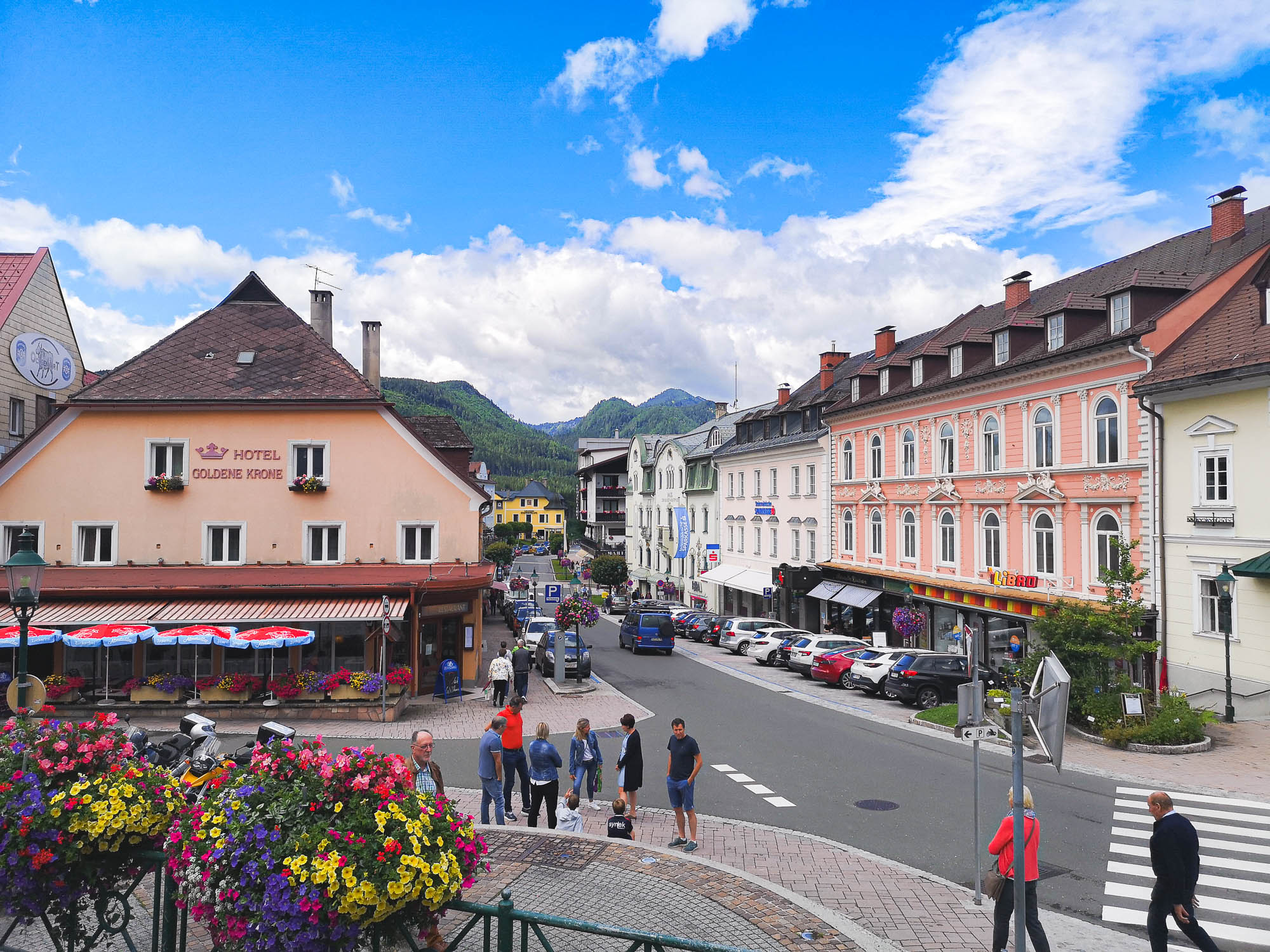
Mariazell will steal you heart straight away. Photo by Alis Monte [CC BY-SA 4.0], via Connecting Vienna
Mariazell Details
- Location: Mariazeller Land
- Province: Styria
- Coordinates: 47°47′00″N 15°19′00″E
- Distance from Vienna: 143 km / 89 mi
- Distance from Graz: 136 km / 85 mi
- Distance from Linz: 107 km / 66 mi
- First mentioned: 1157
- Population: Approximately 3,546 (as of 2021)
- Area: 57.7 km² / 22.3 mi²
- Elevation: 868 m / 2,848 ft
- Weather: Mariazell weather
- Best time to visit: May to September for hiking and sightseeing; December to March for winter sports
Map of Mariazell Land

The panorama of the Ybbstal Alps from Mariazell is breathtaking. Photo by Alis Monte [CC BY-SA 4.0], via Connecting Vienna
Mariazell History
The history of Mariazell is one of faith, resilience, and continuous transformation. From a humble monk’s cella to one of the most significant pilgrimage sites in Central Europe, Mariazell’s story continues to unfold, captivating the hearts and imaginations of all who visit.
The Early Beginnings
The story of Mariazell begins in 1157, with a humble monk named Magnus. Magnus was a monk from the Benedictine monastery of St. Lambrecht, and it was he who established a cella (small monastery) in this remote corner of the Styrian wilderness once he decided that he wanted to be a hermit monk. To this cella, he brought a lime-wood statue of the Virgin Mary, which, who knows, might have been sculpted even by his own hands. Little did he know, this simple act would lay the foundation for a pilgrimage site that would inspire millions across the centuries.
A Miracle Attracts Attention
Mariazell’s true rise to prominence began in 1200 when a miracle was reported. According to legend, a local nobleman named Heinrich von Kuenring was attacked by a wild boar during a hunting expedition. In his desperation, he prayed to the Virgin Mary, and his life was spared. In gratitude, Heinrich expanded the cella, transforming it into a chapel dedicated to the ‘Maria in Cell’ – the ‘Mary in the Cella,’ which later evolved into ‘Mariazell.’
News of the miracle spread, and pilgrims began to visit Mariazell, seeking solace, miracles, and answers to their prayers. Over time, the chapel was further expanded, eventually becoming the grand Mariazell Basilica we know today, a striking example of late Gothic architecture with a Baroque facade added later on.
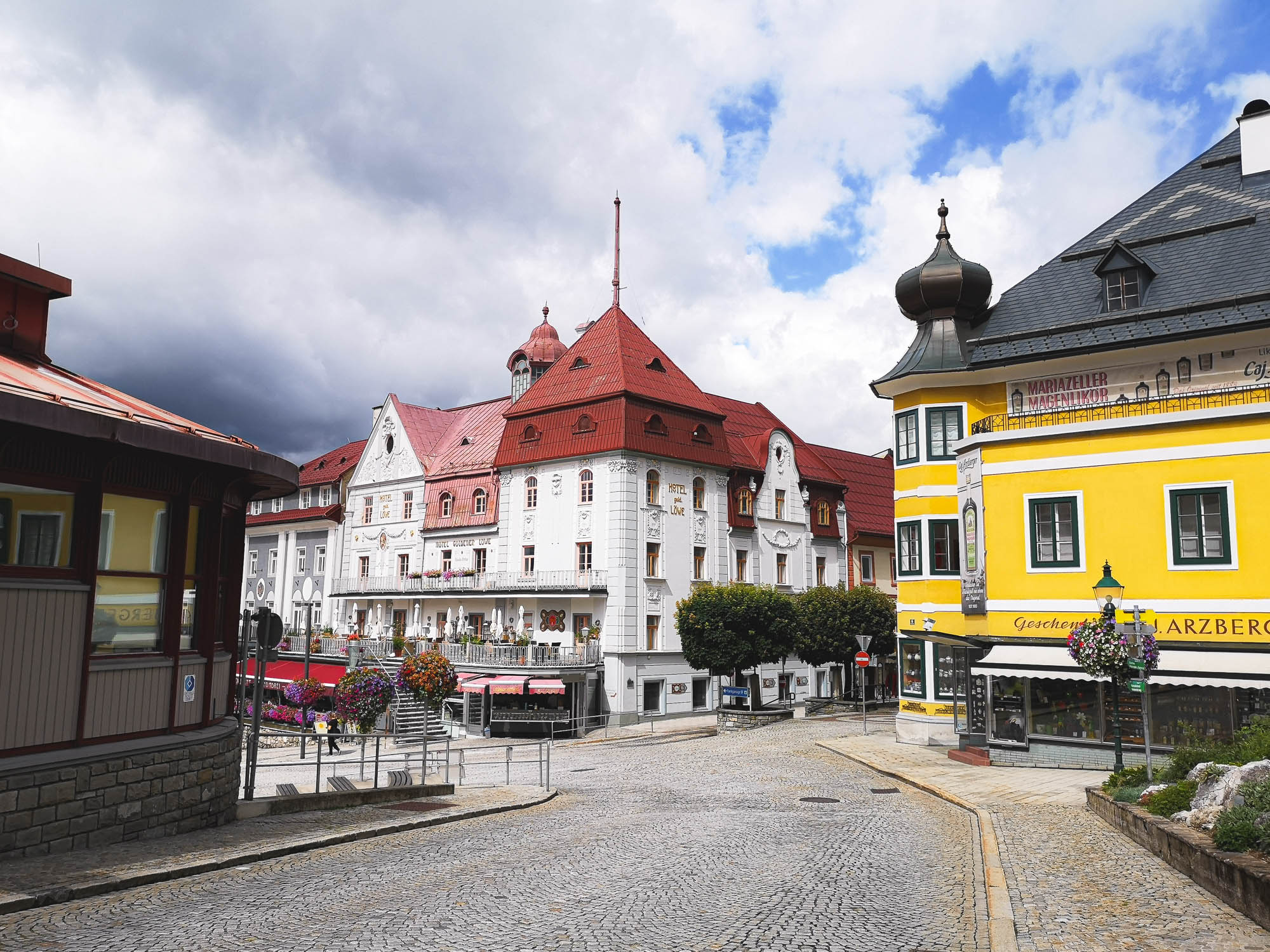
Mariazell is filled with fancy hotels. Photo by Alis Monte [CC BY-SA 4.0], via Connecting Vienna
The Peak of Pilgrimage and the Turbulent Times
The peak of Mariazell’s popularity as a pilgrimage site came in the 17th and 18th centuries, during the Counter-Reformation, when it was visited by emperors, kings, and commoners alike. The town saw thousands of pilgrims each year, drawn from across the Habsburg Empire and beyond.
But this golden age was not without its difficulties. The Reformation, the Turkish invasions, and the two World Wars of the 20th century all brought challenges. Yet, through it all, Mariazell remained a beacon of faith, enduring as a testament to the devotion of its pilgrims.
Name Origins
The long journey started almost 900 years ago when one Benedictine monk went on a mission to the current area of Mariazeller Land to help the locals living as hermit. The legend tells that on his path, the monk encounters a huge boulder blocking his way. Instead of giving up, he turned to the Mother of God for help and his devoted prayers were heard. The rock was split and the monk made his way through to establish a small “cell” to reside and house the statue of Virgin Mary. This was the humble neginning of Mariazell.
Mariazell Today
Today, Mariazell continues to be a vibrant center of spirituality, attracting hundreds of thousands of pilgrims annually. The Basilica houses the magnificent statue of the Virgin Mary, known as the ‘Magna Mater Austriae,’ the Great Mother of Austria, and is the centerpiece of the town.
Every year, on December 8th, the town celebrates the Feast of the Immaculate Conception, a highlight of which is a grand procession carrying the revered statue through the snow-laden streets. But Mariazell is not just about religious fervor. It also has become a hub for hikers, skiers, and nature lovers, drawn by the area’s stunning natural beauty.
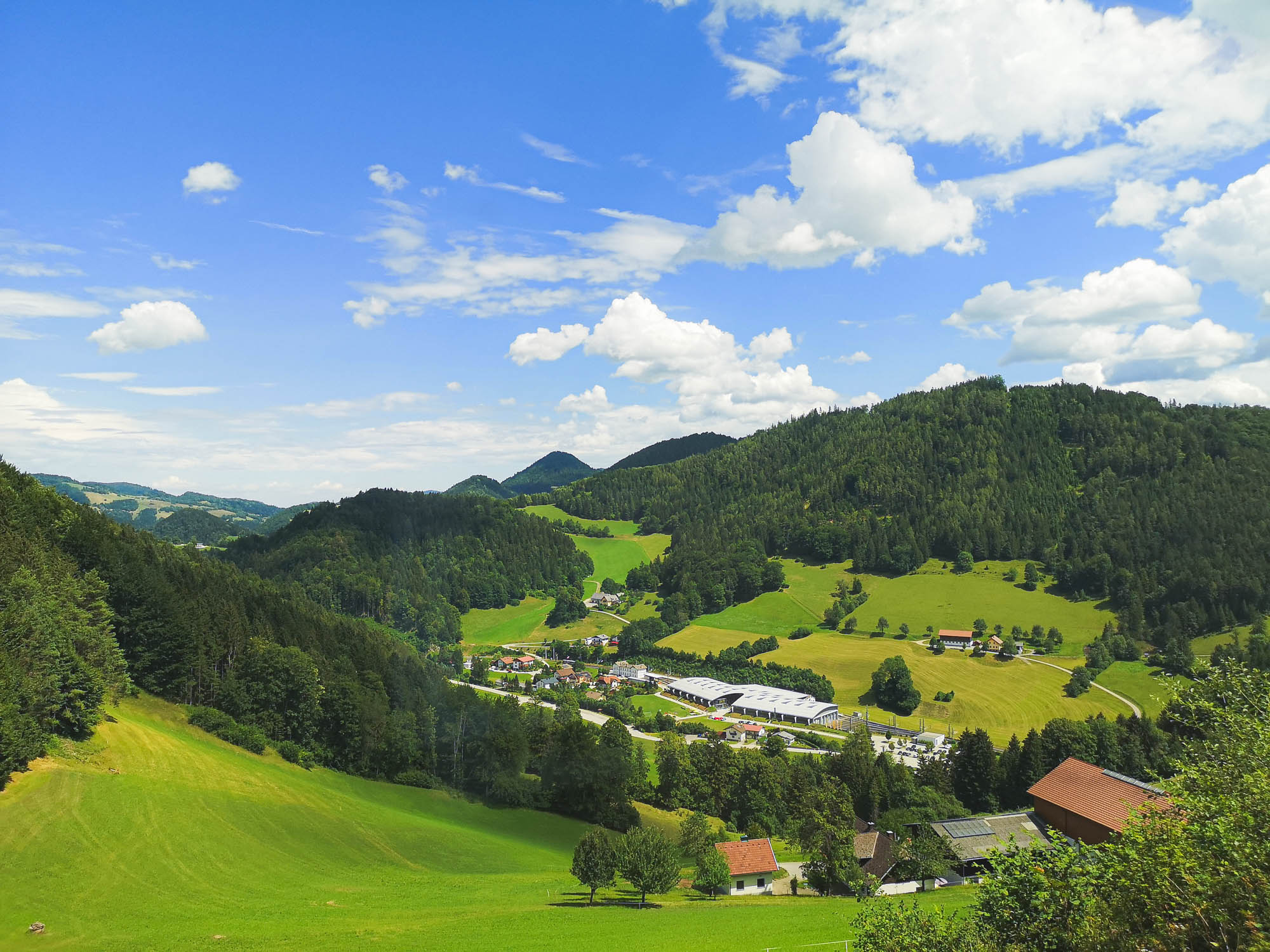
The view from Mariazellbahn won’t let you get bored. Photo by Alis Monte [CC BY-SA 4.0], via Connecting Vienna
How to get to Mariazell
By Train (Mariazell bahn)
This is one of the most beautiful railways in Austria. Like with many such train lines, it is often operated by private companies making it more expensive and excluded from universal tickets. Luckily, you can board Mariazell bahn with VOR Freizeit ticket just for 19.90EUR. The train to Mariazell operates from St Pölten and takes about 2h30 to complete the whole track.
By Train and Bus
It is also possible to take any OBB train operating between Graz and Wien that stops in Murzzuschlag. In this Styria town take bus 189 which will take you to Mariazell in about an hour.
By Car
From Vienna, Mariazell is a two-and-a-half-hour drive via the S33 and B20; simply follow the A1 and A21 to St. Pölten, continue on the S33 until reaching B20, and then follow this road straight to Mariazell. If you’re coming from Graz, take the A9 to St. Michael and then follow the B113 and B20, which will lead you directly to the picturesque town of Mariazell in about two hours.
By Foot
The Via Sacra is the most traditional pilgrimage route, a 130-kilometer journey beginning at the Cathedral of St. Stephen in Vienna and heading southwest through Lower Austria before reaching Mariazell, typically taking around 7 days to complete on foot. Alternatively, if you’re starting from Graz, you can follow the Mariazell Pilgrimage Trail, a 74-kilometer route through the Styrian Alps that offers breathtaking natural beauty and typically takes around 4 days to traverse.

Mariazell is the most popular pilgrim destination in the country. Photo by Alis Monte [CC BY-SA 4.0], via Connecting Vienna
Things to do around Mariazell
Situated in an exceptionally beautiful part of the Lower Austria and Styria boundary, Mariazell has a lot to offer, wherever in terms of cultural or nature activities. For the first time visitors there are quite a few obvious destinations worth considering.
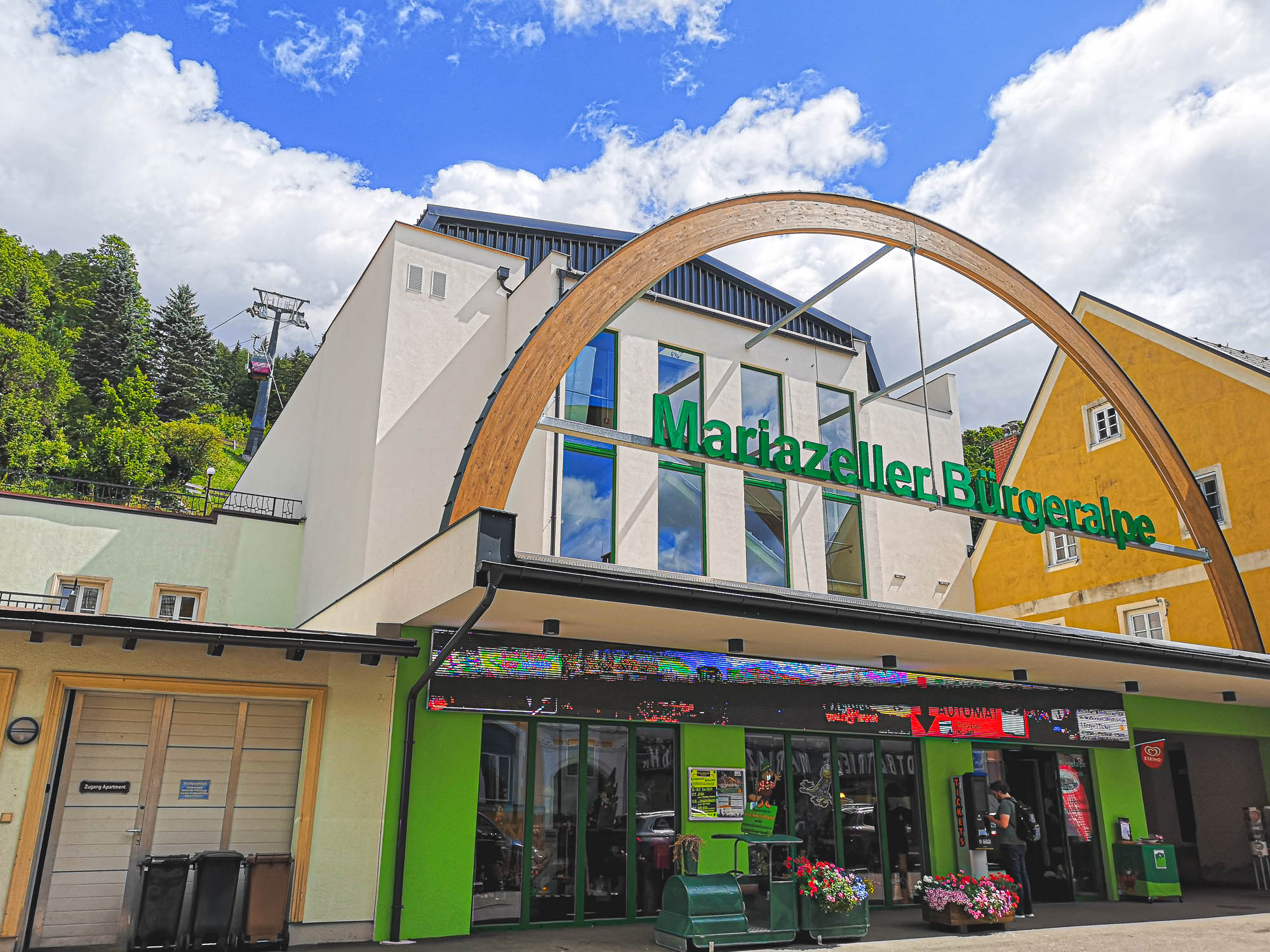
Mariazeller Bürgeralpe is the first funicular built in Austria (1928). Photo by Alis Monte [CC BY-SA 4.0], via Connecting Vienna
1. Spend a Day in Mariazeller Bürgeralpe
The Mariazeller Bürgeralpe chairlift could be the highlight for many people visiting Mariazell. It transports guests to over 1,267 m / 4,156 ft to the peak of Bürgeralpe, offering breathtaking panoramic views of the town and surrounding Styrian landscape. Once at the summit, visitors can explore the numerous hiking trails, the adventure park, and in winter, excellent skiing and snowboarding facilities. The Bürgeralpe is also home to the “Himmelswiese,” a celestial-themed adventure area featuring the world’s largest sundial, an observatory, and a telescope, making it a fascinating visit for all ages.
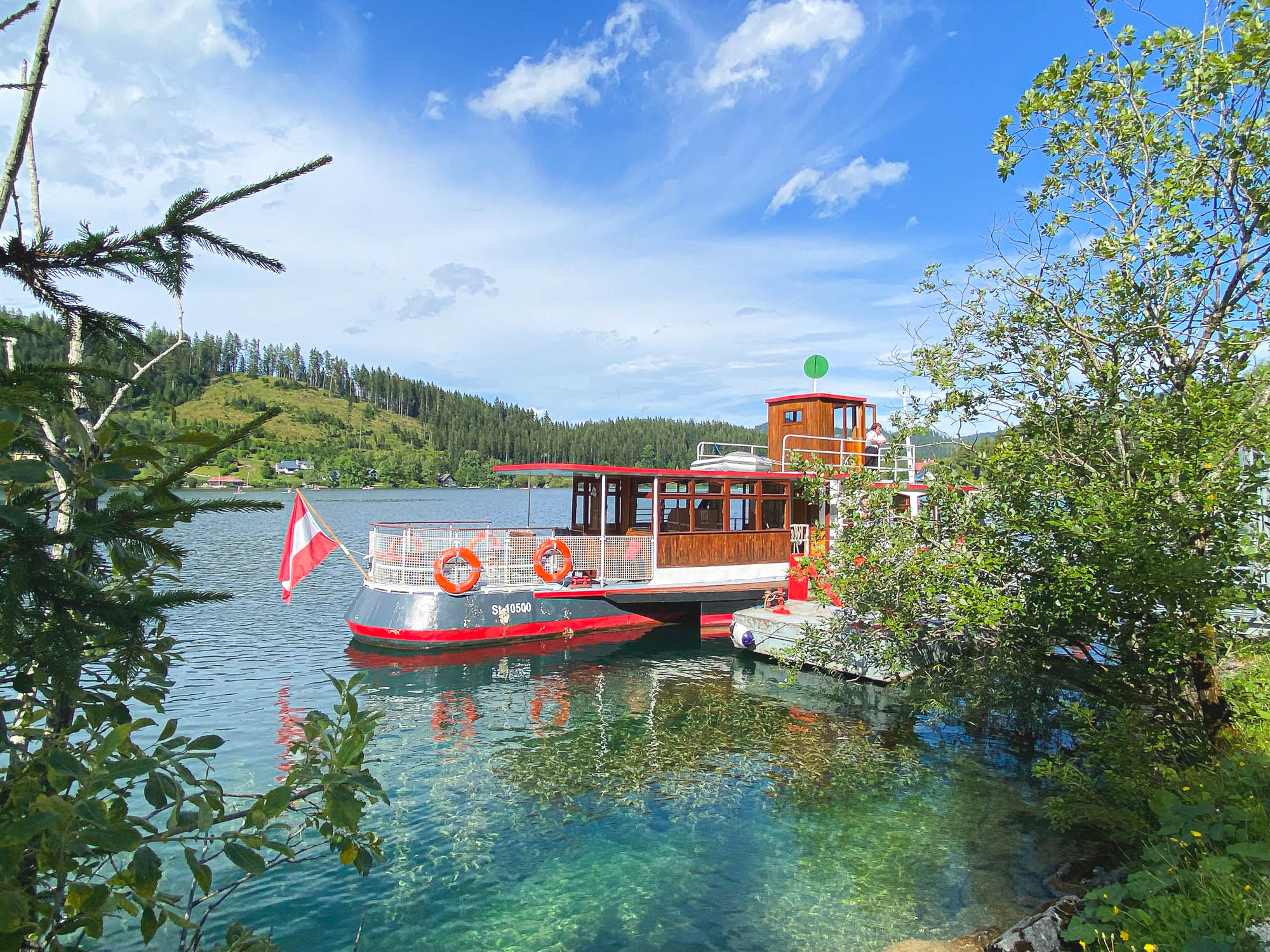
The boat cruises every hour from the far end of the beaches. Photo by A.L. [CC BY-SA 4.0], via Connecting Vienna
2. Take a Boat Tour in Erlaufsee
Embracing the serene waters of Erlaufsee with a boat tour is an absolute must when visiting Mariazell. As you glide across the lake’s glass-like surface, you’re treated to awe-inspiring views of the surrounding Styrian Alps, a spectacle that’s equally breathtaking whether bathed in summer’s vibrant greens or autumn’s fiery hues. The boat tour also provides an opportunity for serene contemplation, the quiet rhythm of the boat against the water, and the pure alpine air serving as a delightful tonic for body and soul.
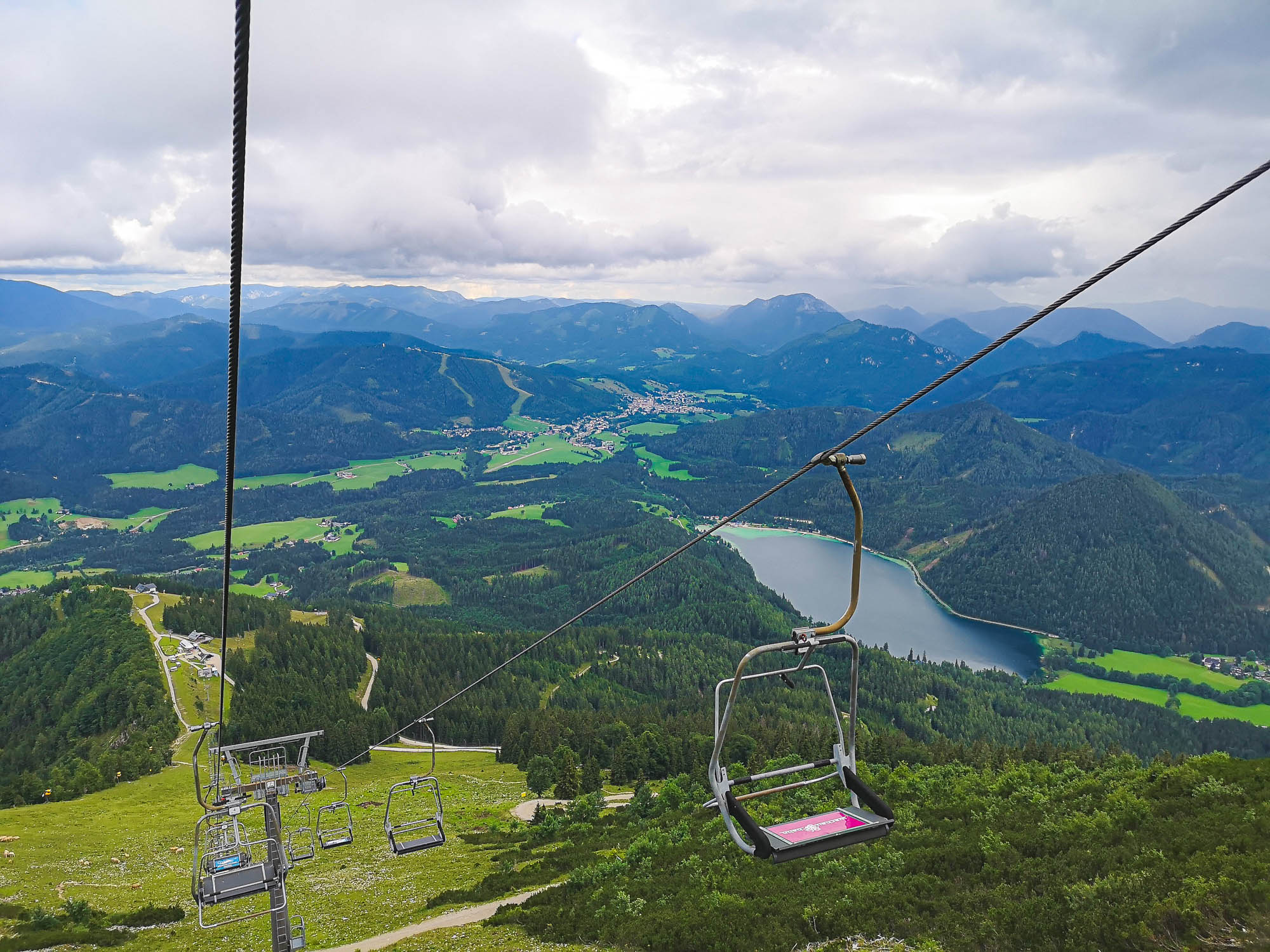
The chairlift to Gemeindealpe is located in the nearby Mitterbach am Erlaufsee. Photo by Alis Monte [CC BY-SA 4.0], via Connecting Vienna
3. Take Gemeindealpe Chairlift
Getting to the top of the mountain that is visible clearly from any spot in the valley where Mariazell is located is a real treat to anyone. Gemeindealpe reaches 1,626 m / 5,334 ft above the sea level and provides spectacular panoramic views in every direction. The chairlift to the mountain is located in Mitterback am Erlaufsee, which is situated right next to Mariazell. It could be reached either by Mariazellbahn or regional bus 197. Gemeindealpe is also a great spot for a hike on a mountain ridge deeper into Ötscher-Tormäuer Nature Park.
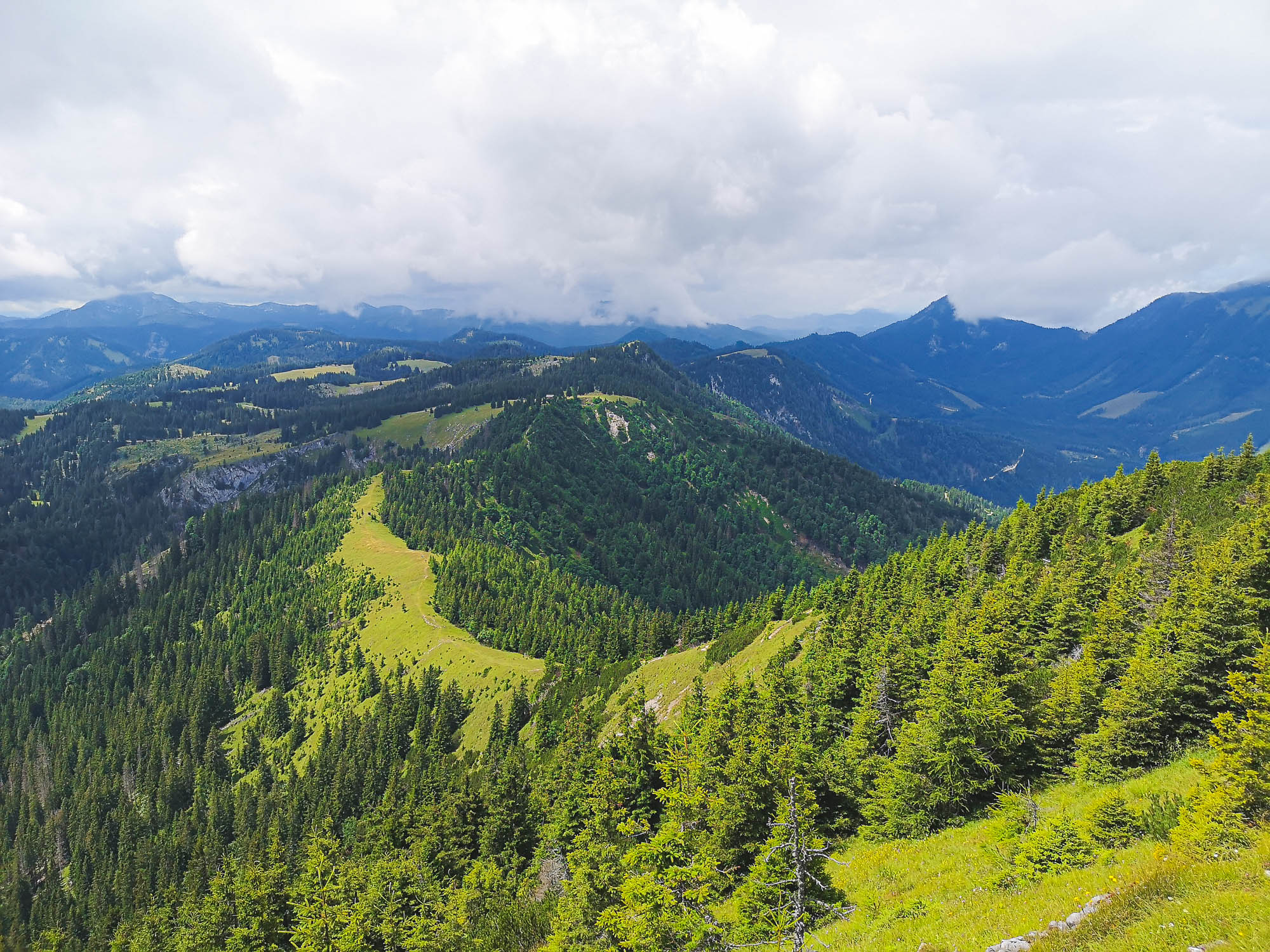
The vista of Ybbstal Alps & Ötscher-Tormäuer Nature Park from Gemeindealpe. Photo by Alis Monte [CC BY-SA 4.0], via Connecting Vienna
4. Hike in Ötscher-Tormäuer Nature Park
Situated on the edge of the region, Ötscher-Tormäuer Nature Park is the biggest nature park in the Lower Austria. For a very long time, it has been fascinating people given the park’s rich environment: wild gorges with bizarre rock formations, waterfalls, caves, quiet untouched forests, lush ferns, and colorful orchids. Ötscher-Tormäuer Nature Park is known the most for Ötschergräben, a river gorge often called the grand canyon of Austria. Its crown jewel – Mount Ötscher (1,893 m / 6,211 ft) is the raison d’etre of the park and the symbol of Mostviertel, one of the four regions of the Lower Austria.
Pro tip: The best train stops to enter Ötscher-Tormäuer Nature Park are: Gösing, Wienerbruck, and Erlaufklause.
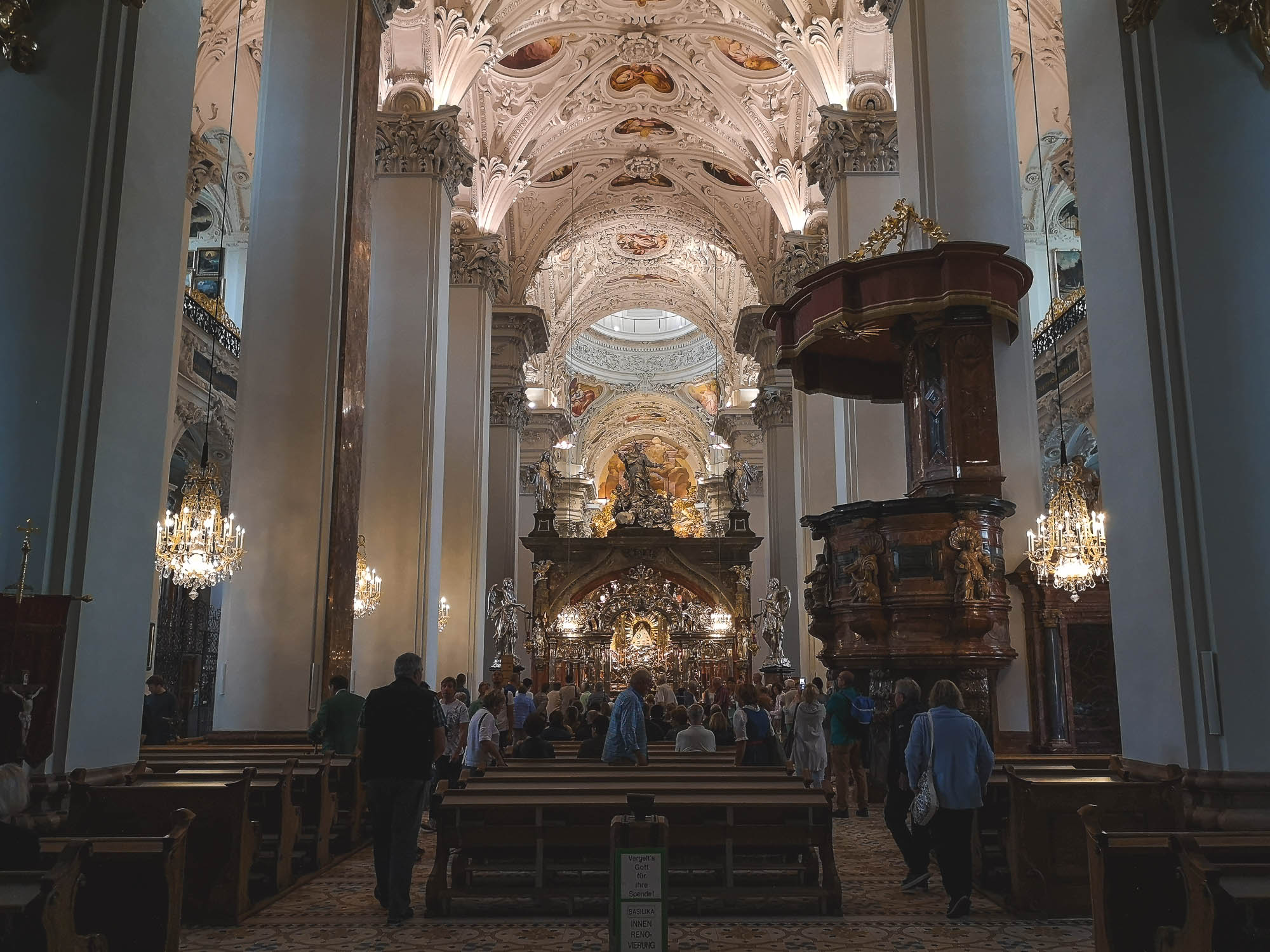
Virgin Mary was brought to Mariazeller Land by a hermit monk Magnus in 1157. Photo by Alis Monte [CC BY-SA 4.0], via Connecting Vienna
5. Visit the Great Mother of Austria
A visit to Mariazell without visiting the miraculous Virgin Mary is an insult the whole history and the reason of the city. It is OK to skip the Great Mother of Austria if you came to the area for nature but if you step your foot into the city, you must go and pay your respects. Otherwise, who knows what might happen to you… Jokes, aside, I think atheists can visit Mariazell as well. It is a fascinating town, but at least embrace the fact that it wouldn’t stand here if it was not for a little Virgin Mary figure carved out of a lime tree. In case you wonder, she lives in the middle of Mariazell Basilica and grants wishes to the worthy.
Mariazell Highlights
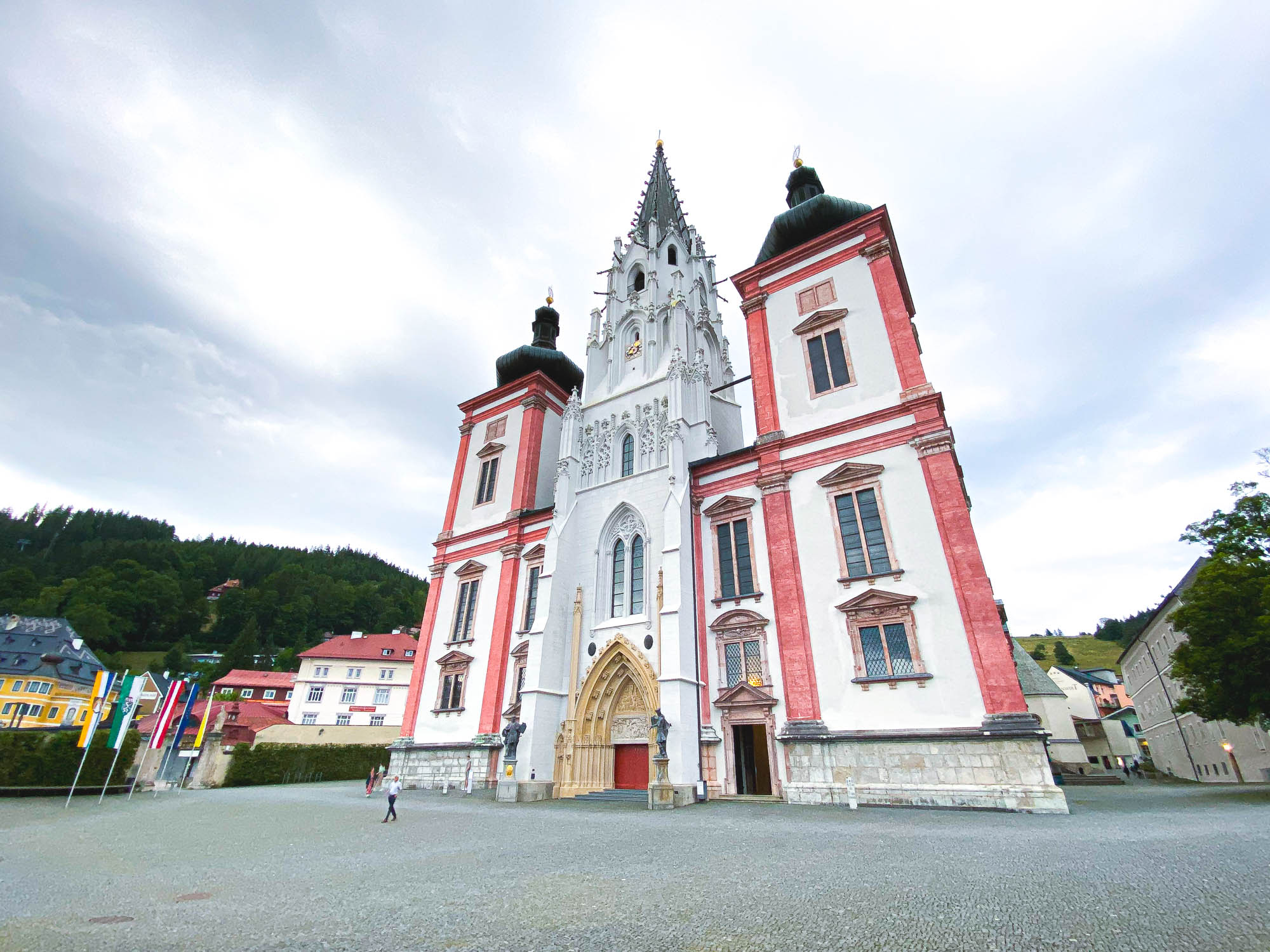
Mariazell Basilica is a mix of Gothic and Baroque architecture styles. Photo by Alis Monte [CC BY-SA 4.0], via Connecting Vienna
1. Mariazell Basilica
The Mariazell Basilica is the town’s centerpiece and Austria’s most important pilgrimage site. Housing the ‘Magna Mater Austriae,’ a revered statue of the Virgin Mary, the Basilica is an architectural masterpiece, combining elements of Gothic and Baroque styles. It draws hundreds of thousands of visitors annually who come to pay their respects and seek spiritual solace.
2. Mariazeller Bürgeralpe
The Bürgeralpe offers a breathtaking chairlift ride to its 1,267-meter peak, offering panoramic views of Mariazell and the surrounding Styrian landscape. The summit is home to numerous hiking trails, an adventure park, and the “Himmelswiese,” a celestial-themed adventure area. During winter, it transforms into a skiing and snowboarding paradise.
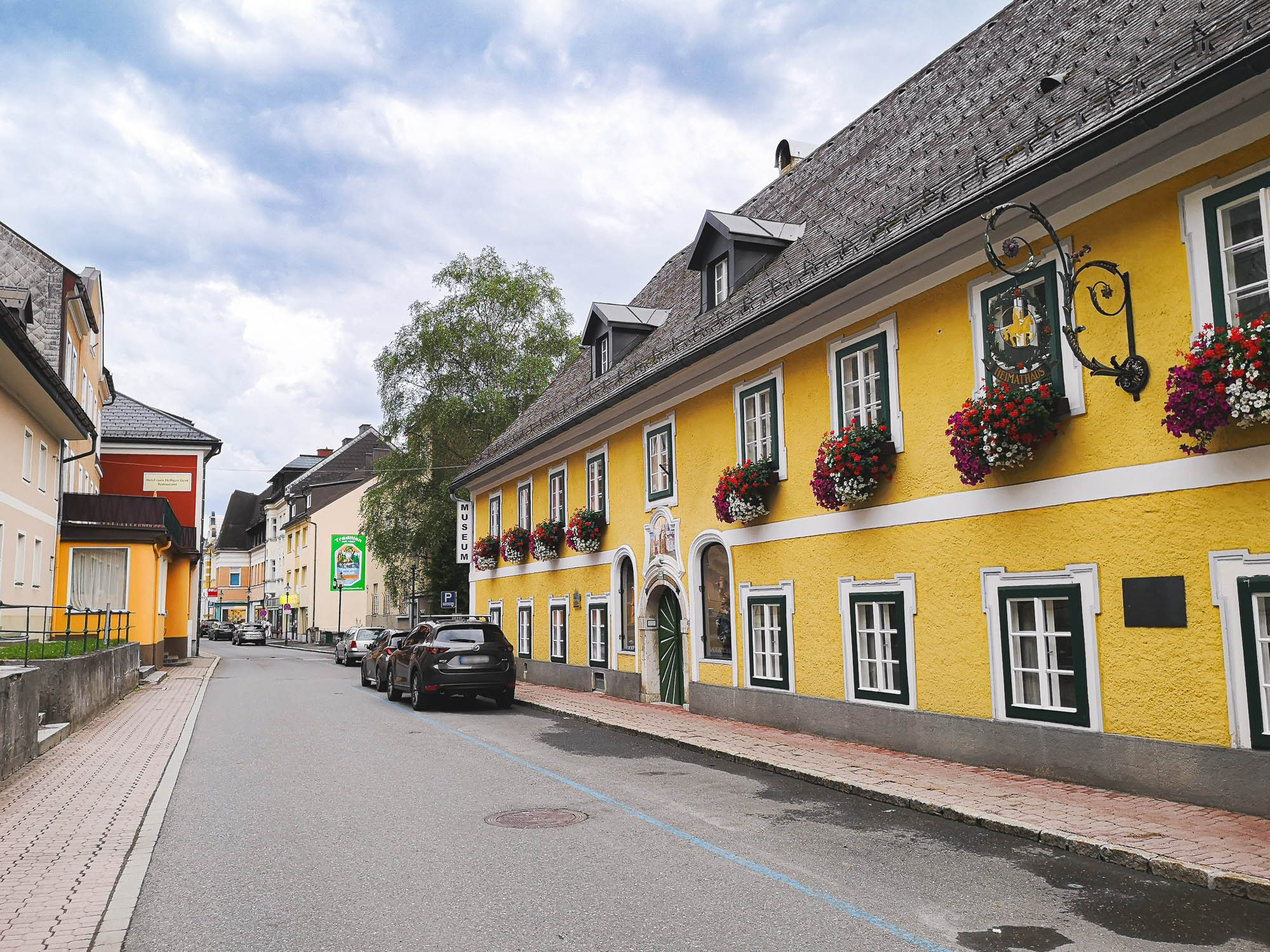
Mariazeller Heimathaus is an old pharmacy. Photo by Alis Monte [CC BY-SA 4.0], via Connecting Vienna
3. Mariazell Museum
The Mariazell Museum, housed in an old pharmacy building known as Mariazeller Heimathaus (Eng Mariazell homestead), is a treasure trove of local history and culture. Exhibits showcase the traditional ways of life in the region, the significance of pilgrimage in the town’s history, and the renowned ‘Mariazell Lebkuchen’ gingerbread. An audio guide accompanies the exhibits, providing in-depth information about each artifact.
4. Mariazell Lebkuchen (Gingerbread)
No trip to Mariazell would be complete without trying the town’s famous gingerbread. Made from honey, nuts, and a variety of spices, Mariazell Lebkuchen has been a local specialty for over 200 years. Visitors can taste these delicious treats in local shops and even take a workshop to learn how to make them.
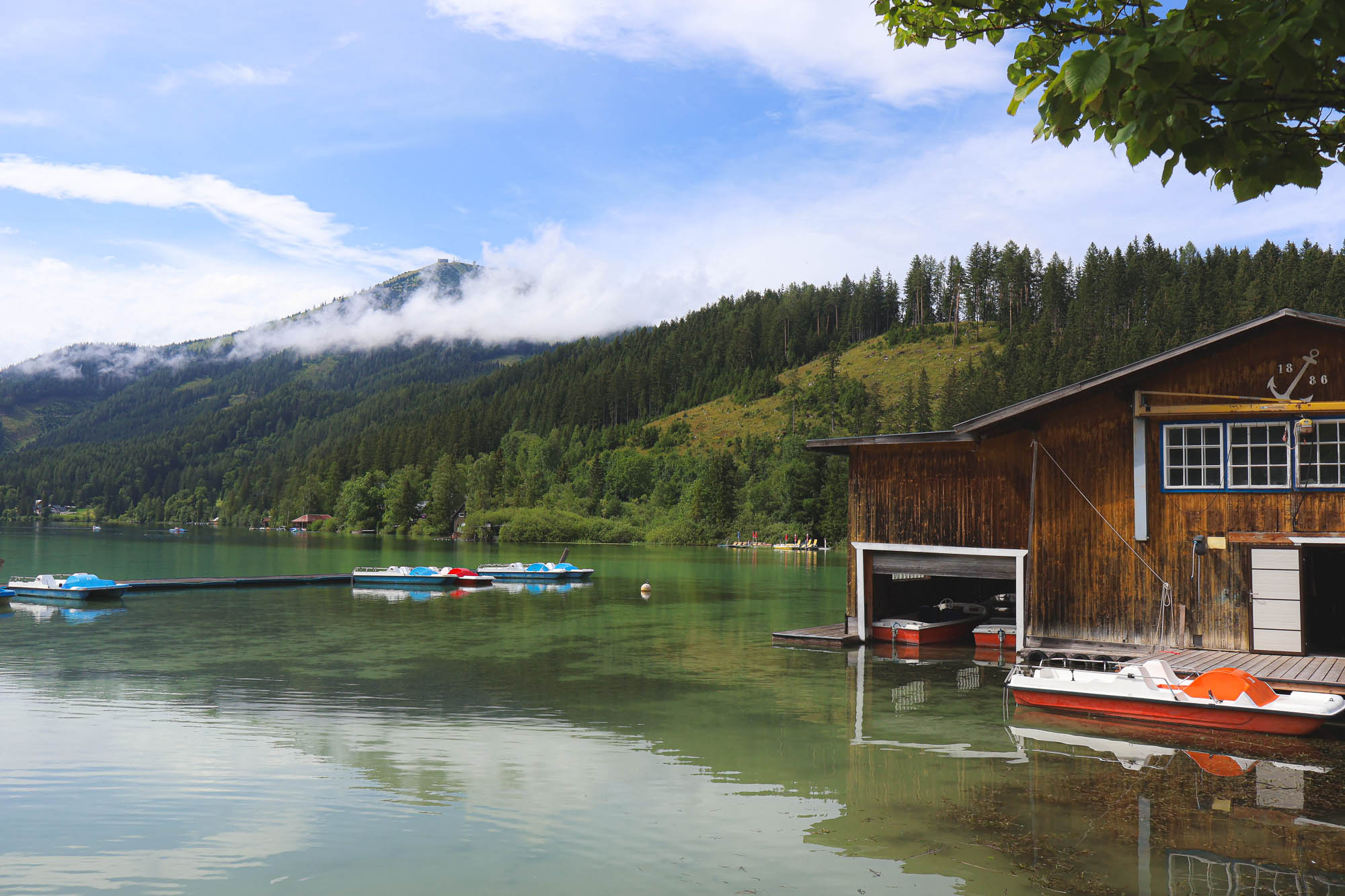
Gemeindealpe topping Erlaufsee. Photo by Alis Monte [CC BY-SA 4.0], via Connecting Vienna
5. Erlaufsee Lake
A short distance from Mariazell, the Erlaufsee Lake is a pristine body of water nestled amidst stunning alpine scenery. One of the greatest things about the lake is the vast public beach areas which are not always the case in Austria. In summer, Erlaufsee is a perfect place for a swim, but the area also offers, hiking, restaurants, boat rentals and even an antiquarian boat ship cruises around the lake, while winter transforms it into a frozen wonderland perfect for ice-skating. No matter your preferences, great time and picturesque views are guaranteed. Erlaufsee is a great place to spend some time with family or refresh after a tough hike.
A historical steam tram could bring you from Mariazell train station straight to the lake, where among all the popular activities you can enjoy a ride on a historical ship around the lake.
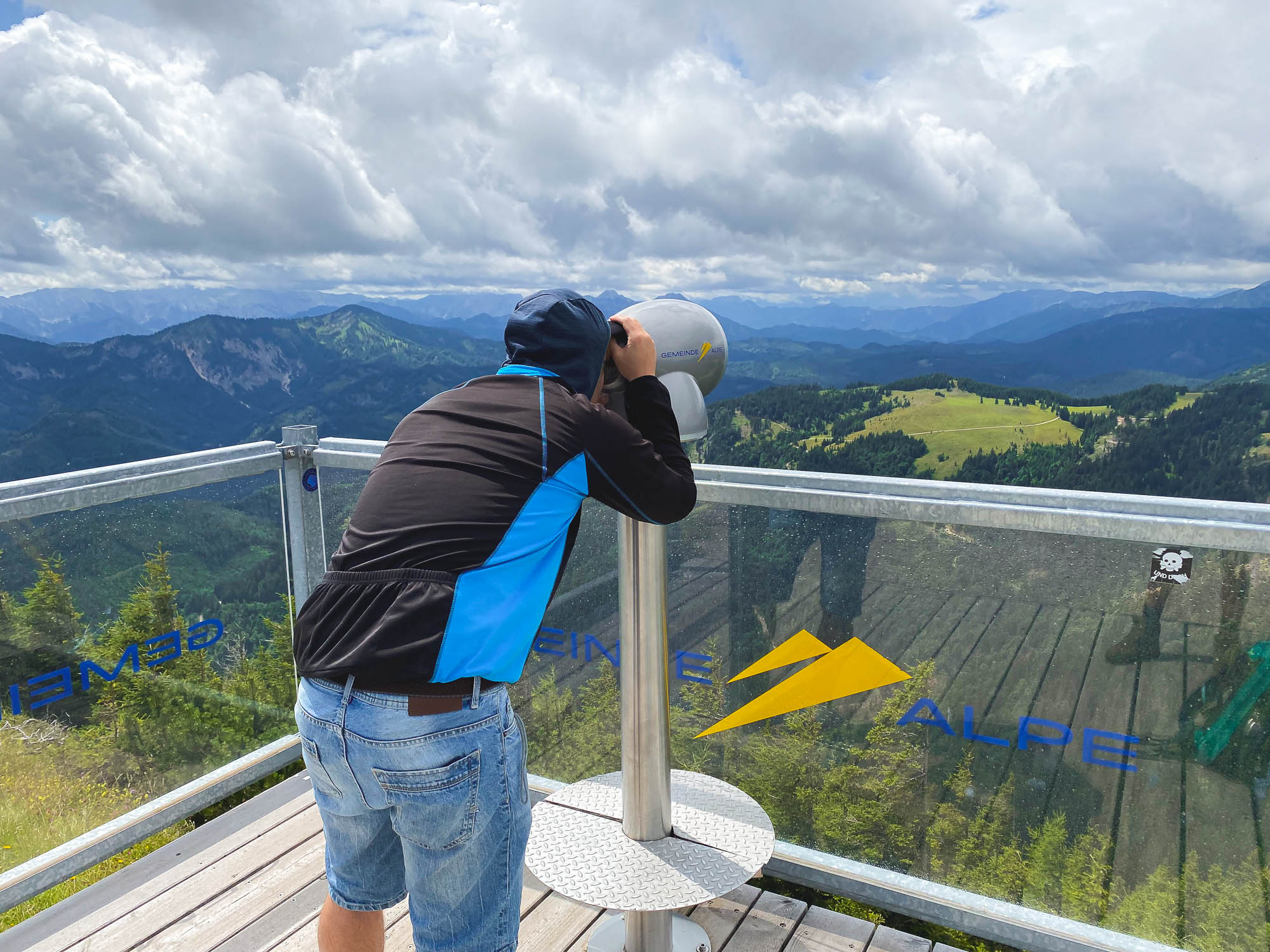
Gemeindealpe chairlift will bring you close to the mountains without any hustle. Photo by A.L. [CC BY-SA 4.0], via Connecting Vienna
Personal Experience
I have to admit that Mariazell left me with mixed feelings but at least I know why. There is no ‘but’ hiding in the shadows, the place is simply overused, and what is supposed to be a remote religious refuge in the mountains became a buzzing shopping mall. Of course, I’m 100% for various local shops and crafts like homeopathic alcoholic bitter Mariazeller Jagasaftl, or Pirker but Palmers doesn’t strike me local brands. With over-tourism comes shady hotels and overpriced restaurants with relatively low quality, so you have to do rather good research to dodge those as well.
Given all that, if you manage to put the pieces well together, it is not that hard to understand why so many people seek this place in the first place. Of course, there is Virgin Mary making miracles, but there is more bliss in the area. The monk chose this place for a good reason. It is simply magical. The panorama of the surrounding mountains includes many prominent peaks giving an impression of a more dramatic landscape than it actually is. The view gets even better if you chose to take either the cable art to Gemeidealpe or Burgalpe. If you combine this with the spectacular experience that Mariazellbahn provides, the cozy streets of the city, Baroque and medieval architecture, and a close escape to wild nature, you get a truly perfect escape to the Alps, at least from Styria, the Lower or Upper Austria. Mariazell makes a perfect weekend getaway or a week’s vacation to the Austrian mountains.
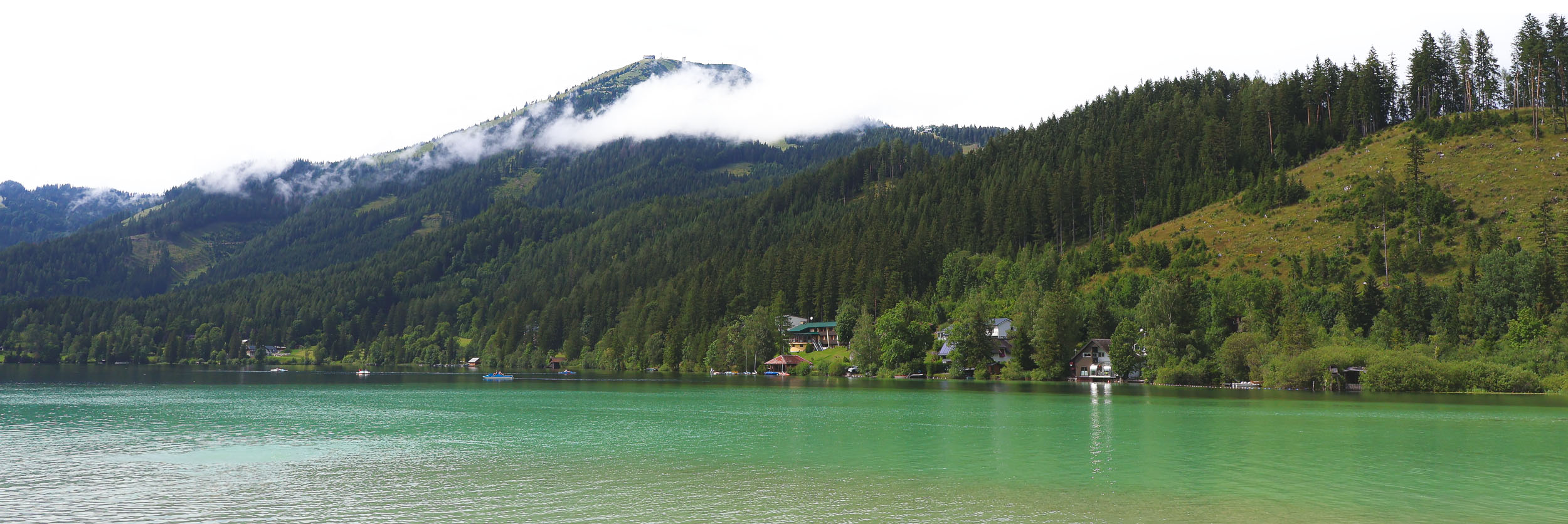
All content and photos by Alis Monte, unless stated differently. If you want to collaborate, contact me on info@ctdots.eu Photo by Alis Monte [CC BY-SA 4.0], via Connecting Vienna